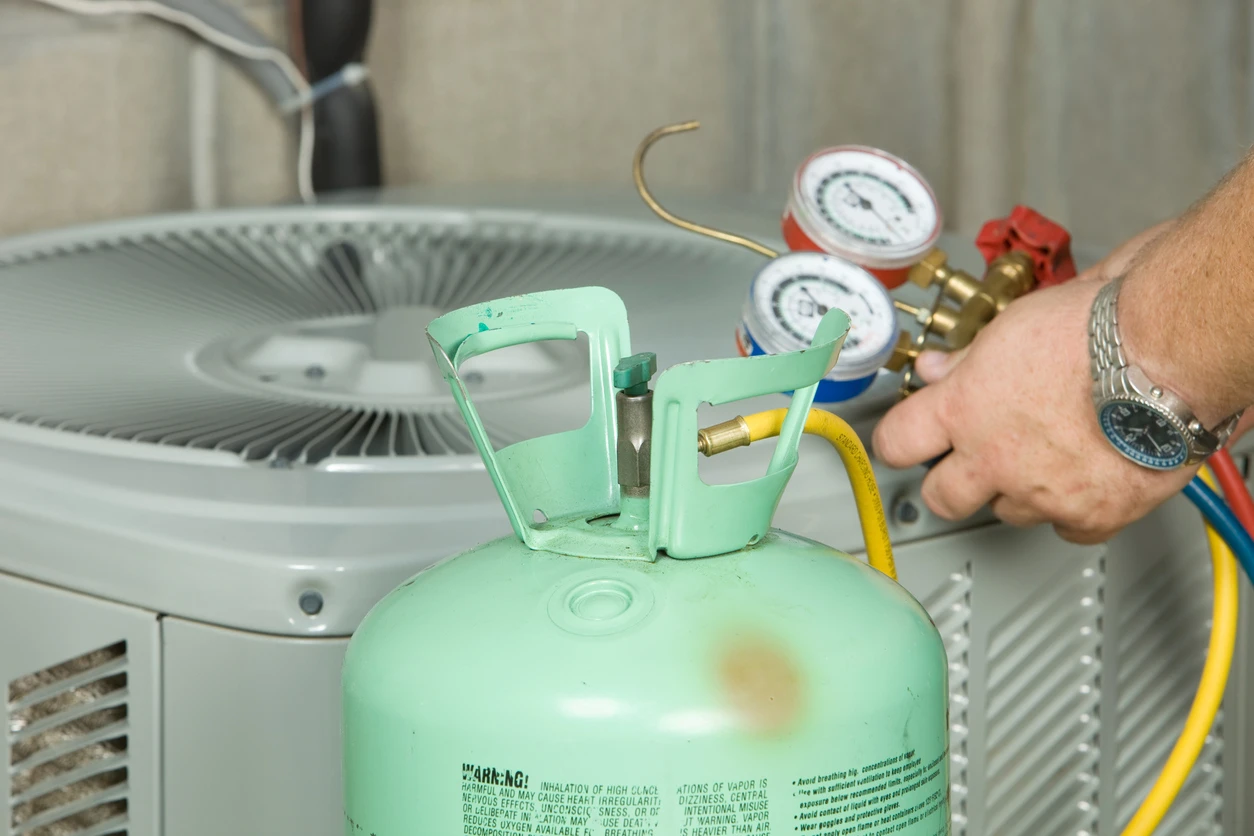
How Refrigerant Works
Refrigerant is a chemical blend that naturally soaks up heat from the environment. It serves an integral function in air conditioners and heat pumps – aiding the refrigeration cycle by cooling evaporators and compressors. Air conditioning systems hold refrigerant inside copper coils. These coils absorb external heat, converting the refrigerant from a low-pressure gas into a high-pressure liquid. The AC’s mechanical parts dispel the hot air outdoors and distribute the cool air inside.
Although difficult to understand, refrigerant plays a pivotal role in most HVAC equipment. Consequently, you’ll benefit from knowing the ideal refrigerant level for your HVAC unit and what to do if its levels are low. We will also discuss whether you should refill the refrigerant or call an HVAC company to perform this hazardous task. At Aire Serv of Nashville, we are ready to assist with all your refrigerant questions, concerns, and issues. Our technicians understand the urgency of handling leaky refrigerant problems quickly and effectively. We will rush over to the rescue!
AC Units Rely on Varying Refrigerants
The dominant type of refrigerant used in HVAC equipment has evolved over the years. Chlorofluorocarbons (CFCs), such as R12, were commonly used until 1994. Unfortunately, these refrigerants were prohibited due to excessive greenhouse gas emissions. Hydrochlorofluorocarbons (HCFCs), such as R22, were less detrimental to the ozone but gradually phased out by the Environmental Protection Agency’s (EPA) Clean Air Act of 2010. As of 2022, the U.S. government mandates all HVAC technologies to be energy independent of R22.
Today, the most common refrigerant is composed of chlorine-free Hydrofluorocarbons (HFCs), including R410A and R134. This mixture is more environmentally friendly and less damaging to the ozone.
Air conditioners with R410A refrigerant also produce:
- Better air quality
- Improved cooling and comfort
- Higher degrees of energy-efficiency
- More durability/reliability
Why Low Refrigerant Is A Serious Problem
A low refrigerant charge is an alarming sign. But how does one know there’s low refrigerant in an AC unit? One telltale indicator of leaky/low refrigerant is a sudden and precipitous drop in the AC’s cooling capacity. Insufficient refrigerant levels will limit an air conditioner’s ability to absorb and dispel heat through its evaporator coils. An AC unit’s primary function is to transform this heat into cooling via a chemical reaction catalyzed by the refrigerant. Its inability to do so will drastically reduce the cooling properties – leading to the release of lukewarm/warm air through the supply vents.
The Causes of Low Refrigerant
Pesky Leaks
The most common culprit of low refrigerant is a leak within the AC unit. Defective valves, corroded evaporator coils, or loose fittings can cause refrigerant leaks. Unfortunately, it can be hard to detect a leak due to the chemical blend evaporating as it interacts with indoor air temperatures. Any remaining fluids will likely create insignificant, difficult-to-spot, and inaudible drips. You’re better off looking out for frost or ice on the indoor coil Instead of refrigerant droplets.
A Broken Compressor
The AC compressor can break if refrigerant levels remain low for too long. Considered the “heart of an AC unit,” the compressor raises the refrigerant’s temperature and pressure as it releases from the evaporator coils. This pressure difference converts the refrigerant into a hot gas that circulates within the system. However, an AC compressor requires a specific refrigerant charge to work correctly. If a leak is left untreated, the compressor will eventually overheat, burn out, and fail – ruining the cooling system. You’ll likely need a new AC unit – replacing a compressor is expensive and often leads to operational problems.
Frozen Evaporator Coils
A frozen evaporator coil is a recurring sign of refrigerant issues, and your AC unit demands immediate attention. Ice and frost on an air conditioner unit often arise from an insufficient refrigerant charge creating low pressure within the refrigerant coils. This scenario can cause the evaporator coil’s external temperature to drop significantly enough that the evaporated moisture freezes along the coils. We recommend turning your air conditioner off and letting the coils thaw immediately if you observe frost. Recharging refrigerant requires special tools and expertise. Let our experienced and knowledgeable technicians handle the task for you!
Consequences of Low Refrigerant
Increased Humidity
First and foremost, we recommend installing a whole-house dehumidifier for maximum humidity control. Nevertheless, an air conditioner can reduce indoor humidity to comfortable levels – pulling moisture from the air by evaporating cold refrigerant. Therefore, humidity levels will dramatically elevate when your AC unit has a refrigerant leak and reduced charge. It’s wise to have a professional inspect your HVAC system if you are experiencing extreme humidity. After all, continued levels of high humidity pose many health risks and foster mold growth.
Decreased Energy Efficiency
Sky-high electric bills can result from a refrigerant leak. This spike is sometimes due to an AC unit’s inability to dispel heat during each cooling cycle. Decreasing operational performance will cause the air conditioner to operate overtime to deliver sufficient cooling. Longer runtime directly translates to increased energy consumption and costs.
Noisy Hissing or Bubbling
Is your air conditioning unit hissing or bubbling? These sounds are frequent signs of a refrigerant leak. Hissing can occur when the refrigerant’s chemical compounds convert and escape into a gaseous state. Bubbling can transpire when the chemical mixture leaks in liquid form. Reduce the noise and boost your cooling by reaching out to an HVAC expert without delay!
Refrigerant Problems? Call A Pro
An air conditioner’s job is to generate cold air. Unfortunately, a refrigerant leak can hamper its capacity to cool your property. Don’t risk your property and safety – contact an HVAC technician as soon as possible if you suspect a refrigerant leak within your system.
Don’t hesitate another day: Schedule an appointment by calling or contacting us online!

